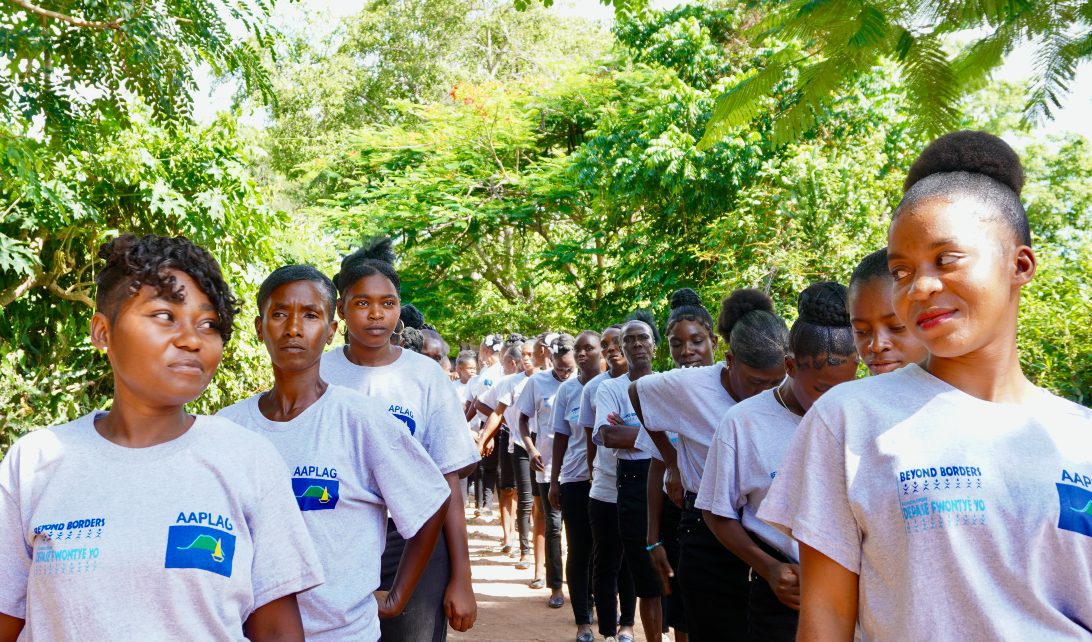Daphney Jacques (standing), Rethinking Power Program Coordinator
By Brian Stevens
Jacmel, Haiti – Who are the most influential people in your community? Most would likely cite elected officials, business owners, civic leaders and media personalities. But in Haiti, there’s a different answer to that question – religious leaders.
“Religious leaders are very influential,” said Daphney Jacques, who coordinates Beyond Borders’ Rethinking Power program to prevent violence against women and girls. “People follow them as though they are the guides of their conscience,” she added. “They have a huge number of people who highly respect them.”
In Haiti, houses of worship – and those who lead them – are among the strongest, most influential institutions, held in higher esteem than just about any other civic or state entity. That made partnering with churches – a key component of Rethinking Power’s community mobilization efforts – a natural choice for Jacques and her fellow activists. “We can touch more people,” Jacques said of Rethinking Power’s work with religious leaders.
This past summer an annual gathering organized by Protestant churches in Haiti’s southeast demonstrated that point when more than 2,000 attended an eight-day conference. During the conference Rethinking Power community activists were invited to give multiple presentations on preventing violence against women and girls.
David Diggs, Beyond Borders’ executive director, believes that Rethinking Power’s strategic decision to engage religious leaders is recognition of the foundational role spiritual leaders play in realizing social change. “Any successful social movement that I can think of – be it in the U.S. or Haiti – has engaged religious leaders in the struggle for justice and liberation,” Diggs said.
The partnership with religious leaders, which began in 2010 with Beyond Borders’ launch of Rethinking Power in the southeastern port town of Jacmel and surrounding communities, is proving to be mutually beneficial to both pastors and activists working to prevent violence against women and girls.
“The reason pastors are moving to collaborate with us is that they believe doing so helps them to both better teach and follow the message of Christ,” Jacques said.
Earlier this year Pastor Laloi Pierre, who since 2006 has led a 350-member congregation in Jacmel, invited Rethinking Power community activists to conduct trainings in his church on how to balance power and how ordinary people can intervene to stop violence against women.
“We wanted this because we wanted to see our society change,” Pierre, 57, said of the trainings. “All kinds of people come to church and we all need training,” he added.
Another cornerstone of Rethinking Power’s effort to engage religious leaders in preventing violence against women and girls is a one-day quarterly training program.
Designed exclusivley for pastors, the training equips leaders from 25 churches with the tools they need to preach about the dividends communities see when women and men balance power at home: a physically and emotionally healthier family life, economically stronger households and a reduced risk of HIV/AIDS.
“It’s about respect,” Pastor Pierre said of the curriculum, stressing a central theme: “Everyone has the same rights.”
Just $50 covers all the costs associated with a pastor’s participation in the conference: materials, food and transportation.
Pierre, married since 1983 and a father of four, said he now uses the same techniques Rethinking Power shares both in his church and his own marriage.
“When everyone understands the need for balanced power, society will begin to change,” Pierre said.
Rethinking Power also engages Catholic priests and leaders in Haiti’s traditional religion.
Chouloute Ossange, a leader in the traditional Haitian religion, said Rethinking Power helped him, “come to understand how to live differently” and that he and his fellow prelate are now sharing this message with their congregants.
“Everybody we meet, we talk to them and we tell them, ‘women aren’t here to beat, you don’t have that right’,” said Ossange, who leads his own temple and is at the helm of Zantray Afrik, an association of practitioners of traditional Haitian religion in Jacmel.
Jacques said Ossange’s two-fold approach to transformation – both personally and in the larger community – is key.
“He’s taken on an engagement to work in his own temple and his own life,” Jacques said of Ossange.
The goal of Rethinking Power is to get all of us – religious leaders included – to recognize that we all have power and to ask ourselves, ‘How am I using my power?’
BEYOND BORDERS WANTS TO KNOW! HOW ARE YOU USING YOUR POWER? POST A COMMENT BELOW AND TELL US!




